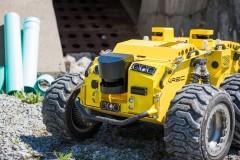Carnegie Mellon's Robotics Institute Expands

The academic institutions providing talent for the exploding robotics markets face volatile times as when, in the case of Carnegie Mellon, UBER recruited a raft of CMU specialists, about a year ago, to establish the Uber Advanced Technologies Center in Pittsburgh. However, in this dynamic environment, institutions quickly bounce back. In response to the growing demand for roboticists, CMU reported that its Robotics Institute has expanded and by last fall had more graduate and undergraduate students – 410 – than at any time in its history. Moreover, it had increased the size of its master’s degree programs by more than a third. Today, the Robotics Institute includes more than 500 faculty, technical staff members and post-doctoral and visiting researchers, giving it the enormous technical breadth and depth of expertise needed for expansive robotics research work. The institute announced it was recruiting five additional faculty members this spring
Carnegie Mellon University’s National Robotics Engineering Center (NREC) has been selected as a prime contractor or subcontractor on four major new federal research projects totaling more than $11 million over the next three years. The projects range from research on a wheel that can transform into a track to automated stress testing for critical software. Herman Herman, NREC director, said the center has hired 10 new technical staff members in the past six months and anticipates hiring another five-to-10 staff members in the coming months to augment its existing staff of about 100. The new research initiatives include:
• A $4 million project for the Defense Department’s Test Resource Management Center (TRMC) to develop automated testing that will ensure the reliability and performance of critical software;
• A $4.2 million Defense Advanced Research Projects Agency (DARPA) project that seeks to develop technology that would enable a wheel to transform into a track so vehicles could tackle a variety of terrains;
• A $1 million U.S. Department of Energy project with Texas A&M University’s AgriLife Center that will use robotic vehicles to monitor sorghum plants being bred to enhance their use as energy feedstocks; and
• A $2.4 million DARPA project with Sikorsky, a Lockheed Martin company, to create automation that would enable existing aircraft to operate safely with smaller crews.
